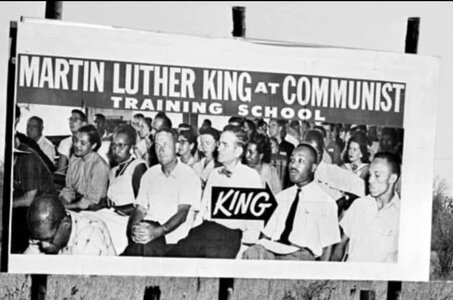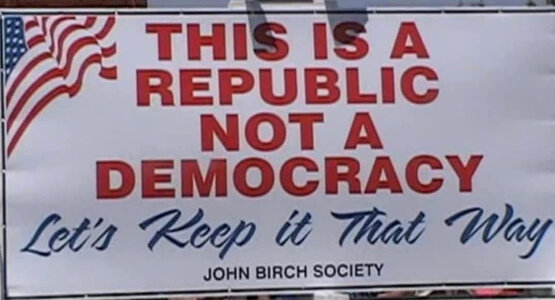
A, THE, Bircher / N.C. Connection: “…
in 1958 Robert Welch of Chowan County North Carolina founded the John Birch Society. The organization was named for a ‘missionary’ killed by Chinese Communists - the circumstances of which are cloudy as they occurred during the days of the Japanese surrender at the end of World War II in China as greatly complicating the narrative, Birch was also an undercover US Army Air Forces Intelligence Officer and OSS operative.
Raised up in Hertford, N. C., Robert Welch eventually came to believe that ‘Reds’ were everywhere-For example, he accused Presidents Truman and Eisenhower of being party members. Welch’s paranoid style haunts what passes for political discourse even today, often poisoning our attempts at progressive dialogue. When a modern conservative proclaims with vigor that “America is not a democracy! It is a republic!” they are working from the “Bircher” script. Of course the US is not a democracy in the purest sense but rather an aspirational ideal as framed by the better angels of our Constitutional Democratic Republic. Historically Bircher obfuscation has been their main play in covertly and overtly asserting the supremacy of State’s Rights as a way to nullify the advances of the Civil and Equal Rights Movements of the past 60 plus years.
Rich from candy trade (yep - THAT Welch) his millions financed his fanatical crusade. A child prodigy, Welch entered UNC at 12 years old and was a graduate of the Class of 1916. He went on to attend the US Naval Academy and Harvard. From its founding in 1958, Welch closely controlled the John Birch Society which at its apex counted 100,000 members, until his death in 1985. The JBS was anti-United Nations because as an organization it represented global collectivism and international cooperation with communists and socialists. The JBS campaigned vigorously for the impeachment of Chief Justice Earl Warren for his support for the Supreme Court’s pro-Civil Rights decisions. Welch and company seem to have genuinely believed that 60+% of the employees of the Federal Government were Communists. The JBS led the targeting of Dr. Martin Luther King Jr. as a Leftist enemy of America. Welch was clearly a harbinger of today’s trumpist GOP lunacy, radical extremism, and dirty politics. That Tar Heels in the Center and on the Left have been in a battle with the despotism of the likes of Jesse Helms, Madison Cawthorn, Virginia Foxx and the constant anti-progress, anti-intellect, and regressive actions of our state General Assembly is bound up in the same ways of seeing that birthed Welch’s twisted worldview.
“…Trumpism is not a reversion to an older, more gothic form of conservatism but an apotheosis decades in the making. Trump may have been our country’s first post-truth president. But the post-truth environment of conspiracy we are living in today has been a long time coming. We owe it in part to the truth-optional habits on the right that Robert Welch and the Birch Society exemplified—and in part to the same Republican elites who were complicit every step of the way."
The John Birch Society Never Left
So a Chowan County candy baron bears much of the blame for the steady development of the truthless worldview that plagues our nation and threatens so acutely the very foundation of the system that has, for just shy of 250 years, been the developing dream of egalitarianism and human and civil rights. Welch passed on in 1985, he was 86, but his ideas are stronger than ever. With 2024 behind us and an uncertain future ahead it remains to be seen if the Bircher Ideal will ultimately win out.”
Wrote that a few months back.



